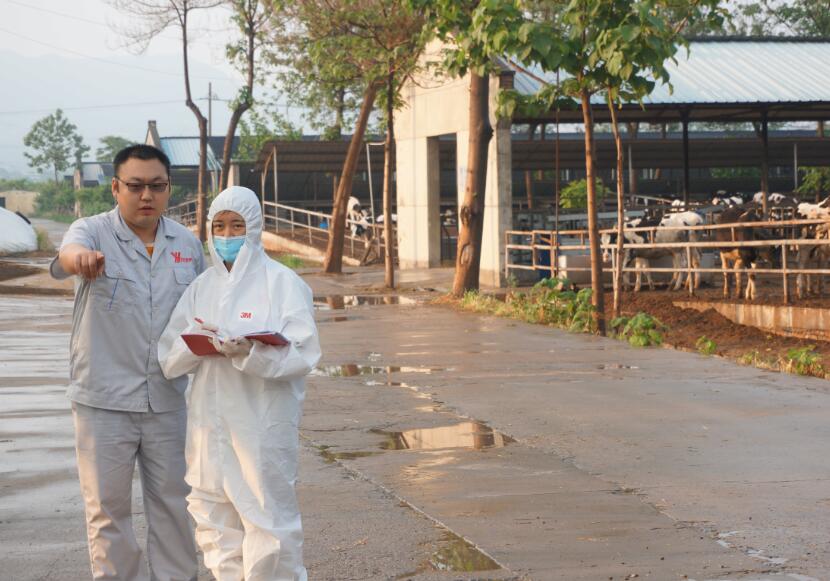(1) Protein: protein is a nitrogen-containing compound and its basic composition is amino acids. There are many types of amino acids, but only 20 kinds of protein can compose protein. Protein is the main component of sheep's body tissues and cells, and is a nutrient necessary to maintain normal metabolism, growth, reproduction and production of various products. Because sheep are ruminants, they can use the microorganism in the rumen to make amino acids and synthesize high-quality proteins. Therefore, the quality requirements of feed protein are not very strict. Rumen microorganisms can use non-protein nitrogen-containing compounds (such as urea and ammonium salts) to convert them into proteins needed. According to this feature, appropriate amounts of urea can be added to the sheep's diet as a substitute for feed protein. Generally, when the protein content of goat diet is 6% -10%, the effect of adding urea is the best.
(2) Carbohydrates: the main function of carbohydrates is to provide energy for the body, participate in the synthesis of mucopolysaccharides, glycoproteins, etc. It is an essential substance for maintaining normal body temperature and life activities. The carbohydrates in the feed are mainly starch and fibrous substances, which are mainly decomposed and absorbed by the action of sheep rumen microorganisms. The digestibility of crude fiber in goats can reach 50% ~ 90%. In order to improve the digestibility of crude fiber in goats, (1) the crude protein level in the diet should reach 10% ~ 14%; (2) the content of crude fiber in the feed should not be too high, generally should be controlled at 16% to 18%; (3) to add appropriate amount of salt in the diet can increase the digestibility of crude fiber; (4) to cut the roughage properly after feeding, but if cut too short or crushed , it will reduce the digestibility, generally to cut into 3 cm ~ 4 cm is better. When feeding the Boer sheep, some high-quality forage such as yam vine and peanut vine can be fed.
(3) Fat: fat is an important component that constitutes carcass tissues, such as nerve, muscle, blood, etc. Fat can also be converted into energy, and it is also a solvent for certain vitamins (such as vitamin A, vitamin D, vitamin E, etc.). Breeding sheep generally do not directly given fat, but hybrid sheep can use high-energy diets in the fattening stage.
(4) Vitamins: vitamins include fat-soluble vitamin A, vitamin D, vitamin E, vitamin K, and water-soluble vitamins B and C. It plays an important role in body metabolism, energy conversion and nerve regulation. Vitamin deficiency will have an adverse effect on the health, growth and fertility of the body, and will cause death in severe cases. Sheep can synthesize B group vitamins through microorganisms in the rumen and vitamin K through intestinal microorganisms. Therefore, goat generally only needs to be given fat-soluble vitamin A, vitamin D, and vitamin E. Especially in the winter and spring--dry grass season--and house feeding period, ewe pregnancy period and high breeding period, could add some carrots, green hay, barley malt, etc. According to the instructions, mix the vitamins into the concentrate and feed them.
(5) Minerals Many minerals are necessary for the body's metabolism and life activities. The important minerals in goat nutrition are calcium, phosphorus, magnesium, potassium, sodium, chlorine, sulfur, iron, copper, zinc, cobalt, iodine, selenium, etc., the most important of which are calcium, phosphorus and salt. The sodium and chlorine contained in plant-based feed cannot meet the needs of goats and sodium chloride (salt) must be added to the feed. At the same time, salt can also stimulate the appetite of the sheep. Generally, salt and other minerals to be made into bricks, and the sheep can lick them. In seasons with good grazing conditions, calcium and phosphorus are not necessary, but a certain amount of calcium and phosphorus are required for pregnant ewes, suckling ewes, breeding rams and growing sheep, as well as during house feeding period. Calcium and phosphorus and other rich mineral feed are mainly from bone meal and calcium phosphate. Generally, rams need about 10 grams of bone meal per day, and other sheep and hybrid sheep need about 5 grams per day.
(6) Water is one of the most important nutrients necessary for animals and the cheapest feed ingredient, but it is often easily overlooked by people. The various processes of metabolism and life activities in the body require the participation of water. If the body loses 10% of the water, the metabolism may be disordered; if it loses 20%, the animal is in danger of death. Therefore, we must ensure the supply of water and pay attention to drinking water hygiene. Generally, goats need 2 kg to 4 kg of water for every 1 kg of dry feed.





